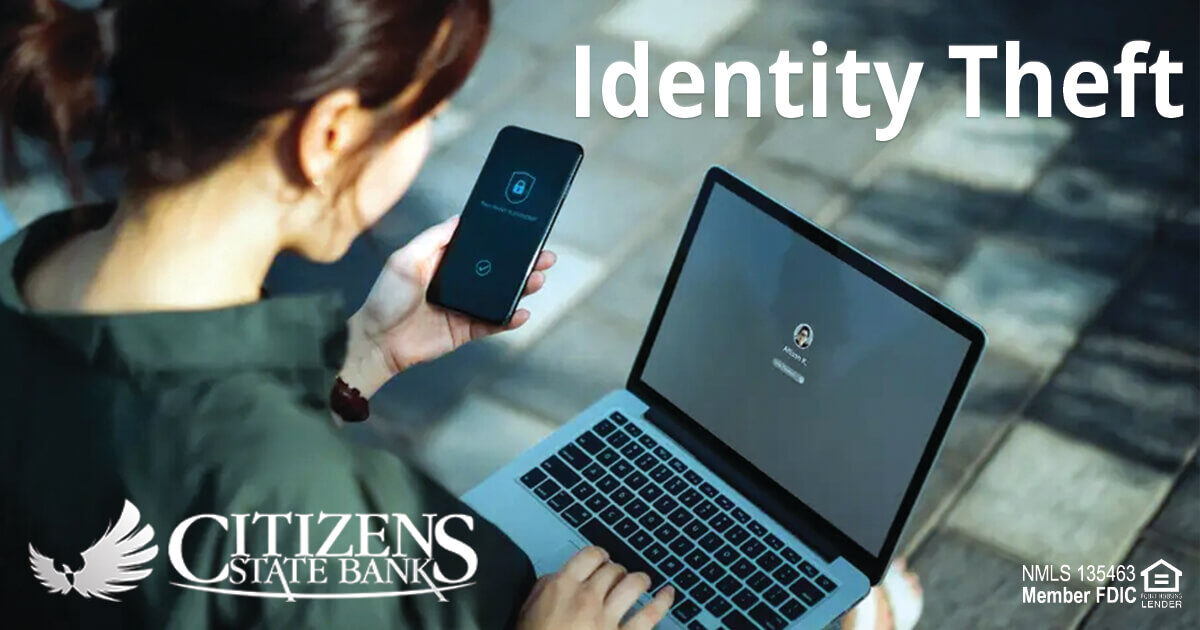Identity theft occurs when thieves steal your personal information (e.g., your Social Security number (SSN), birth date, credit card numbers, personal identification numbers (PINs) or passwords). With sufficient information, another person can use your identity to commit fraud or other crimes.
Avoid Identity Theft
- Protect your personal information – never provide this information in response to an unwanted telephone call, fax, letter, or email, no matter how friendly or official the circumstances may appear.
- Social Security number
- Credit and debit card numbers
- PINs
- Passwords
- Watch out for people trying to look over your shoulder while you use the ATM, seeking to steal your personal identification number (PIN).
- In case your wallet is lost or stolen, carry only the identification you really need: checks, credit or debit cards. Keep the rest, including your Social Security card, in a safe place.
- Protect your incoming and outgoing mail
- For incoming mail – try to use a locked mailbox or other secure location (post office box). If your mailbox is not locked or in a secure location, try to promptly remove delivered mail or move the mailbox to a safer location. When ordering checks ask about having them delivered to your bank branch instead of your home where you run the risk of a thief finding them outside your front door.
- For outgoing mail containing a check or personal information try to deposit it in a United States (U.S.) Postal Service blue collection box, hand it to a mail carrier, or take it to the post office instead of leaving it in your doorway or home mailbox. A mailbox with outgoing bills is a prime target for thieves who cruise neighborhoods looking for account information. Avoid putting up the mailbox flag to indicate that outgoing mail is waiting.
- Sign up for direct deposit of your paycheck, retirement check, and/or state or federal benefits (e.g., Social Security). Direct deposit stops someone from stealing a check from your mailbox and forging your signature to cash the check and steal your money.
- Keep your financial trash “clean”. Thieves are known as dumpster divers and look through garbage for pieces of paper containing Social Security numbers, bank account information, and other personal information to commit fraud. Before throwing away these items, destroy them in a manner that they cannot be easily reconstructed.
- Keep a close watch on your bank account statements and credit card bills.
- Monitor them for discrepancies, and contact your financial institution immediately if you notice anything suspicious.
- Contact your financial institution if a bank statement or credit card bill doesn’t not arrive on time. Missing financially related mail could be a sign that someone has stolen your mail and/or account information, and may have changed your mailing address to run up bills in your name from a phony location.
- Avoid all come-ons for personal information on the Internet. – No legitimate organization/company is going to ask for these details. If you believe the correspondence is fraudulent bring it to the attention of the Federal Trade Commission.
- Review your credit report annually (every 12 months) and report fraudulent activity.
The views, information, or opinions expressed in this article are solely those of the author and do not necessarily represent the views of Citizens State Bank and its affiliates, and Citizens State Bank is not responsible for and does not verify the accuracy of any information contained in this article or items hyperlinked within. This is for informational purposes and is no way intended to provide legal advice.
